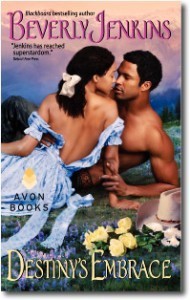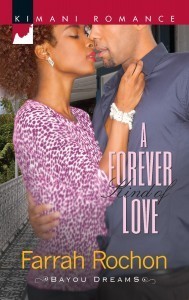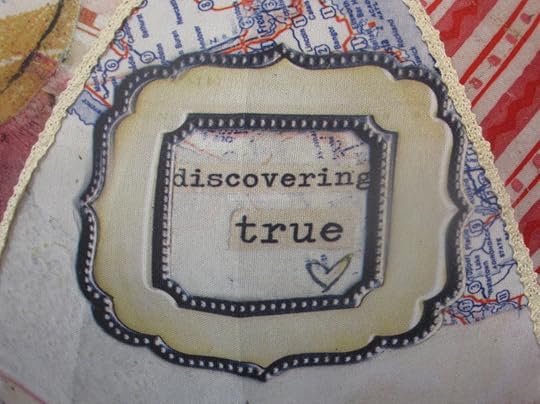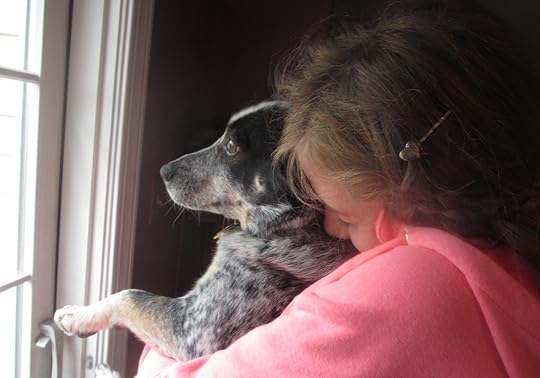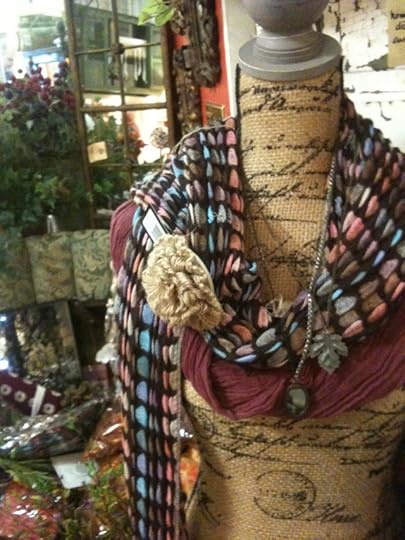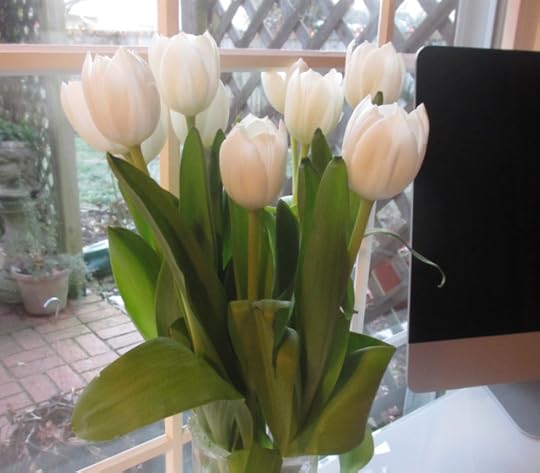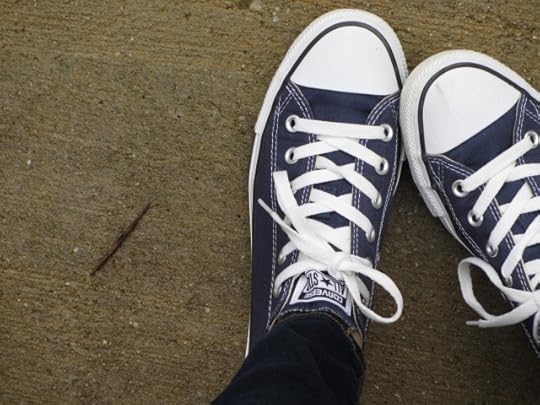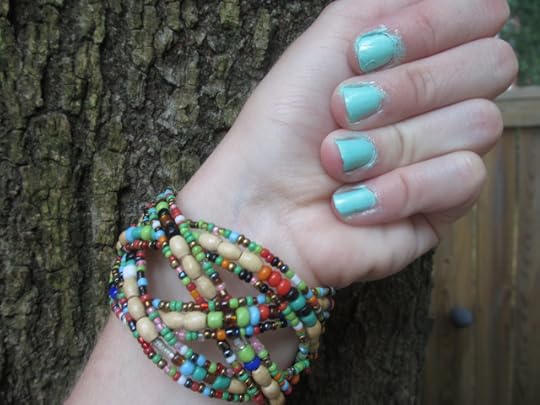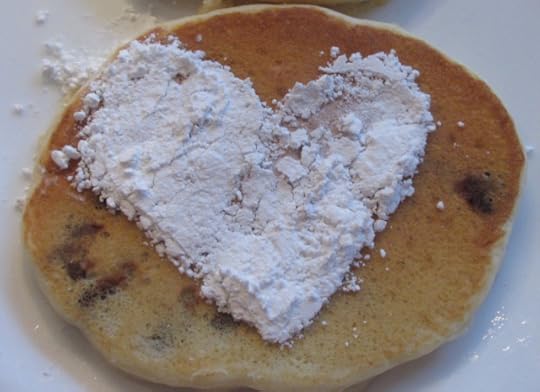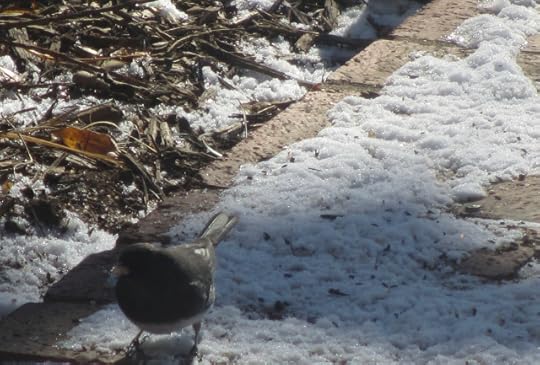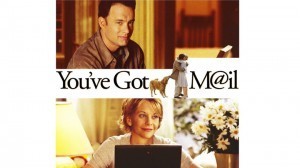Lorenda Christensen's Blog, page 9
March 2, 2014
Nostalgia ain’t what it used to be as I go back to school for World Book Day.
It is thirty-five years since I set foot in my old school. Later this week I shall be back to give a talk to pupils. My visit coincides with World Book Day and they want me to tell them how I came to be a published author. When I got the request to visit, I felt like asking, ‘How did I do it? How long have you got?’
I’ll crunch it down so they don’t drift off to sleep and will try to lay down the toughness of the business without dimming anybody’s dreams and ambitions. One thing I will say in regular beat is, if you want to write, you really do have to read. Not tweets or Facebook feeds but books with beginnings, middles and ends. Lots of them. That message seems to chime perfectly with World Book Day which, in the UK takes place on March 6th. It isn’t just a celebration of books; it’s a multinational push to get the written word to millions of people who find reading hard to access. Nor is it just for the developing world; there are children at home who regard reading as an alien occupation. Good for World Book Day, then, for injecting fun and fizz into literature
As I step up to the podium to deliver my talk I will be staring over a generation gap. The oldest girls in the audience will be seventeen. Quick maths . . . when I quit those echoing cloisters in 1979, they were seventeen years away from being born. When I left school, the world was a different place. The Iron Curtain was still drawn, the Cold War had yet to thaw. The online and ebook revolution wasn’t on the radar.
I’d love to revisit the old attics above the school’s Victorian wing where all the books were stored. It was a treat to be sent up there because it got you out of lessons and let you poke around in areas that were otherwise off-limits. Those attics, which had once been the servants’ bedrooms of a wealthy town house, seemed to possess watching eyes.
Shelving bowed under their burden and every inch of floor was taken up with wobbly columns of text books that would crash down if you were clumsy with your elbows. French, German, Latin readers, classic novels from Alcott to Zola, all had sheets pasted into the flyleaf listing the names of girls who had previously used them. Some of those name went back to the 1940s. ‘Edna Metherell’ ‘Winifred Youens’ ‘Muriel Trubshaw’ – you can put faces to girls with names like that, and even hear their voices.
Going back to my High School is no nostalgia trip, though. I owe my school thanks for the solid grounding it gave me in the arts. Grammar, syntax, spelling, a love of the classics, come from my time there. But it didn’t make me a writer. I became a writer in spite of the disapproval that my hand-me-down uniform and holey socks generated in certain teachers, and the rule-bound ambience which I coped with by tuning out, and which left me creatively paralysed for years. No, I won’t cry sentimental tears but I will check to see if they have got rid of the bottle green tiles that brought a sense of undiagnosed depression to the corridors. I will remind myself that I’m here to talk about books, and about my own mid-life success as an author. I may even murmur a quiet ‘Yay’ at the irony of being invited back to give a, hopefully, inspiring speech after my own uninspiring years there.
But I realise as I write this that I’m grateful for my abrasive schooling and home life. Writers rarely sprout in comfortable soil and it’s the harsh east wind that makes the tree grow into an interesting shape. The girl who spends her time staring out of windows will be the first one to see the rainbow. Or the plane crash, if I’m going to be dark (blame those bottle green tiles.) I will celebrate World Book Day by telling the girls how much I loved books. Crime, mystery, romance, most of Dickens and anything by Jane Austen – between them they got me through. When, after leaving school, I found myself alone in London, jobless and scared stiff, a pile of novels on the bed was my happy place.
And if I see the ghost of my younger self sitting in the audience, I’ll give her a wave and send the silent message, ‘Keep reading, and keep writing. One day, they’ll be inviting you back to speak on World Book Day.’ She won’t hear me. She’ll be making the hole in her sock bigger and staring out of the window.
Natalie Meg Evans is published by Quercus Books, London. The Dress Thief comes out on 5th June 2014
February 28, 2014
How Hot?
I admit, I’m going to shamelessly use this blog to do some readerly/writerly research.
I’m supposed to write about deadlines but who cares about those? (If my editor is reading this, I care. I really do.) Deadlines schmeadlines. (Just kidding, editor!)
Let’s talk about sex. (And now we all have a Salt-n-Peppa earworm. You’re welcome.)
We all know there is a wide array of sexual content in romance novels. From sweet (barely holding hands) to burning down the barn (ball-gag anyone?) With some books, it’s obvious from the cover what you’ll find inside. If the chick is naked and wearing a blindfold, I think most of us can figure out that’s not an inspirational. (Though what a plot twist that would be!)

Have you ordered this one yets? It comes out March 25th! Click the picture to pre-order!
But in some of the more mainstream subgenres, the covers often share very similar looks. A historical with one brief consummation scene is likely to sport a lass with her dress falling off. (I still say 19th century modistes are rolling in their graves over those covers.) The same lass can be found on the cover of a historical that includes a bit more carnality and detail.
So how, as a reader, do you know?
Word of mouth is an obvious answer. If your reader buddy says, “I had to step outside at 1 in the morning to keep from melting after reading a particular scene,” then you know what to expect. But what if it’s a new to you author? And your friend hasn’t read it yet to give it a step-outside rating?
Let’s say the blurb is so enticing, you take the plunge and dive in. The story is fun. There’s great sexual tension. Things start getting serious and then BOOM. Oral sex.
Too much? A pleasant surprise? A deal-breaker? What are your limits? What do you expect from mainstream and do you think those expectations are changing?
Let me be clear. This is not “Is sex taking over romance?” because sex has always been there (long before 50 Shades) and we, as diverse readers, know that a good book is a good book regardless of the number of sex scenes. Give me a satisfying love story and I don’t care if they ever get near a bedroom.
I’m talking about heat levels and how you determine where you’re comfortable. Where do you as a reader draw the line between just enough and too much?
Terri Osburn is the best selling author of the Anchor Island Series. Books 1 and 2, MEANT TO BE and UP TO THE CHALLENGE available now. Learn more about Terri and her books on her website here. If this blog wasn’t enough of a clue, her books include sex.
February 25, 2014
Lost in Translation
Getting published is hard enough, but doing it from Australia, can be even tougher. It’s not just the time difference, or the expense of overseas postage, phone calls and currency transactions. It’s the bloody language barrier. Yep, English shmenglish. As you all know already, English is not the same all over the world.
Now, I’m lucky to have an American critique partner who LOVES all my Aussie/British-isms [waves across the oceans at the fabulous, Heather Ashby] :-) But as an Aussie writer still trying my luck in North American contests and with US agents and editors, I often wonder just how Americanised (yes, with an ‘s’) my English needs to be to succeed. Like, if I used “boot”, would the reader realise I meant the “trunk” of a car? Or, if I wrote the character “walked upstairs to the first floor”, would the reader think he/she was coming from the basement?
It’s a real question of authenticity versus our intended/actual audience. Would our books, written in Australian or British English, be misunderstood, or even thought of as having technical errors in the States?
Maybe it’s just me, but I’ve spent hours wondering how Australian to make my characters. Most contests I’ve entered do not specify penalties for non-American spelling—some even instruct judges not to penalise them—but I have nevertheless lost points for using Australian English for characters and settings in Australia.
So here’s a little cheat sheet that’s hopefully a little bit more informative than watching Crocodile Dundee. The following spelling/grammar/punctuation are also true for British English, but the slang is mainly Australian so they won’t help the next time there’s a Downton Abbey marathon 
Spelling/Grammar/Punctuation
The “-ise” suffix is the same as “-ize” (eg. realise, memorise)
‘ou’ vs ‘o’ (eg. honour, mould, neighbour, favourite, colour, odour)
‘ll’ vs ‘l’ (eg. travelling, signalled)
‘-re’ vs ‘-er’ (eg. centre, metre, theatre)
The extra ‘o’ (eg. foetal, manoeuvre)
dreamnt = dreamed
cheque = check (as in, the form of money)
programme = program
storey = story (the level of a house)
tyre = tire (the rubber part of the wheel)
catalogue/epilogue/dialogue = catalog/epilog/dialog
get/got/got = get/got/gotten
different from/to = different than
talk to = talk with
towards = toward
clothes size = Australian and British sizes sound bigger than American sizes eg. an Australian Size 12 is the same as a Size 10 in the US and a Size 14 in the UK
Mrs/Mr/Ms/Dr = Mrs./Mr./Ms./Dr.
Now, try saying the slang below with an Aussie accent. If you can’t, no worries. Even Meryl Streep couldn’t do it! 
Slang
arvo = afternoon (we like putting an ‘o’ at the end of many shortened words)
Beauty! = Great!
bogan = an uncouth person
boot = trunk (of a car)
budgie smugglers = men’s swimming trunks
chook = chicken
chuck a sickie = pretend to be sick to get a day off work/school
convo = conversation
cot = crib
daggy = unfashionable
dodgy = suspicious, not reliable
dunny = toilet
fancy dress party = costume party
fringe = bangs
grog = alcohol
ground floor = first floor (this means our first floor is your second floor)
hoon = hooligan
How’s it going? = How are you doing?
jumper = sweater
lolly = candy
nappy = diaper
pissed = drunk
pissed off = angry
prawn = shrimp
rego = registration
serviette = paper napkin
singlet = tank top
togs = swimwear (we also use “cozzie”)
torch = flashlight
unit = apartment
whinge (to complain) = whine
woop woop = the middle of nowhere, a really remote area
I hope these help the next time you read a bit of Australian writing :-) Please feel free to add to the list in the comments below. Other forms of English are also welcome :-) Maybe you’ve come across them in your travels or from reading? What do you think of reading other forms of English?
February 23, 2014
Whatcha Reading?
Today, I thought it would be fun to have an open day where we talked about what we’re reading and/or looking forward to reading. Last month, I blogged about expanding my reading horizons and I got some amazing suggestions. My friend, Piper Huguley, suggested I read a Beverly Jenkins book. I so happened to have one of her books on my ereader, so I took Piper’s advice a few weeks ago and read Destiny’s Embrace.
OMG, so funny! The hero, Logan, didn’t know what hit him when the heroine, Mariah, came to town and I loved every second of it. Jenkins also did a great job of weaving in historical facts about California and the African-American experience there during the 19th century.
What’s next? Farrah Rochon is one of my favorite authors, so I’m looking forward to starting A Forever Kind of Love, the first book in her Bayou Dreams series. She’s up to four books in the series, but my TBR pile is out of control, so I’m trying to cut myself a little slack for starting so late.
So what about you? What are you reading? Got any good recs?
Whatcha reading?
Today, I thought it would be fun to have an open day where we talked about what we’re reading and/or looking forward to reading. Last month, I blogged about expanding my reading horizons and I got some amazing suggestions. My friend, Piper Huguley, suggested I read a Beverly Jenkins book. I so happened to have one of her books on my ereader, so I took Piper’s advice a few weeks ago and read Destiny’s Embrace.
OMG, so funny! The hero, Logan, didn’t know what hit him when the heroine, Mariah, came to town and I loved every second of it. Jenkins also did a great job of weaving in historical facts about California and the African-American experience there during the 19th century.
What’s next? Farrah Rochon is one of my favorite authors, so I’m looking forward to starting A Forever Kind of Love, the first book in her Bayou Dreams series. She’s up to four books in the series, but my TBR pile is out of control, so I’m trying to cut myself a little slack for starting so late.
So what about you? What are you reading? Got any good recs?
February 20, 2014
Why That Character?
The Victorian hero of my 2012 Golden Heart finaling novel, A HERO TO HOLD, is disabled. I admit the Registered Nurse part of me played out a secret agenda when I put David Scott in a wheelchair. I wanted to present a character whose disability was dealt with matter-of-factly. It’s part of him but doesn’t define him. It’s something he deals with, but it’s not a huge part of the story. He’s a complete, complex person—who happens to have a disability.
I wanted every woman reader to fall in love with David and find him utterly sexy and desirable and forget he couldn’t stand or walk. I realized I’d achieved my goal when I wrote a scene that had David stalking across the room. I’d forgotten he couldn’t walk!
When I started writing AHTH, I decided to read all the books I could find that featured disabled protagonists—especially those in a wheelchair—to see how other authors had handled such challenging characters. I already had a vision for David, so wasn’t looking for a template. I was just curious.
I didn’t find many, but most I found, I read. The last three years I’ve noticed a huge increase in romances featuring disabled military veterans. I attribute this to the War on Terror and our growing number of veterans left dealing with physical, emotional and spiritual challenges.
In preparing this post, I discovered a really interesting 2012 blog on Dear Author: http://dearauthor.com/need-a-rec/if-you-like-misc/if-you-like-books-about-characters-with-disabilities/. Ridley’s blog post starts with recommendations for books she liked that feature disabled characters. (What I’d originally planned for this post.) Then her post expands, getting into why many authors who write about a disabled character get it wrong, citing oft-recurring themes of what one commenter calls “super-crips and poor unfortunates.”
When I sought out disabled characters, I didn’t spend much time analyzing the themes of the books I read. Ridley’s post presents opinions I wish I’d been privy to earlier. It becomes a vetting on how disabled characters are often portrayed— and concludes they’re too often shown either as people who’ve overcome every physical obstacle and are fairly impervious, or as those emotionally crippled by their disability. Many of the commenters reveal they have disabilities, and so feel they’re particularly astute regarding how the disabled are portrayed.
The post made me wonder how good a job I’d done with David. I showed how some of David’s traits helped him successfully deal with his disability. Other personality traits left him vulnerable and sometimes coping with anger and depression. One thing I know I got right. The story is about David, not his disability.
I made David physically disabled because I wanted to change the view of a person who looked at a man in a wheelchair and saw a wheelchair first and a man second—a disabled man. After reading my book, I hope that person sees a man—and, oh yeah, he’s in a wheelchair.
To be honest, I’m not sure why I wanted to do this, but I suspect authors often have personal reasons for the themes and characters they choose to write about. They might be driven by a need to teach, explain or help. They might want their readers to care about something that’s important to the author. Or maybe, perhaps without even realizing it, they want to explore something inside themselves.
Have you read a novel that changed your opinion or your view of something? Did you have a personal reason for writing about a particular theme or character? I’d be interested to hear.
February 18, 2014
FOCUS – Do You Have It?
Have you found yourself wondering whether or not you have ADHD? Can you sit still and focus on your words without hopping over to the internet and back? Lately, I’m hearing all kinds of complaints about the lack of Focus– the dreaded word that every writer craves.
Focus is a concentrated effort or attention on a particular thing; an area of concern, responsibility, or investigation; the quality that makes an image sharply defined with clear edges and contrast.
Writers need FOCUS to let their creativity loose. We need words on the page in order to edit a story into a sale. But in today’s world, there are so many distractions and drains on our lives. We’re ruled by technology and while the techno age is welcoming to some, it can be hazardous to a writer’s business – words.
There are many focus drains within the time we allot to our writing –
Social media – Facebook, Email, Twitter, Pinterest, Tumblr, Google and more
Research—all internet based versus leaving home for a library visit, phone calls, dvds
Noise—radio; MP3 music; e-books, television, computer video ads
Distractions used to be phone calls and maybe the television or radio. And we still face those same distractions in the form of telemarketers, charity calls, computer robo calls on home phone lines and via our cellphones.
Add in LIFE, which is family, pets, weather, technology, age, more…NOISE. Noise that robs us of the mental peace we need to write.
Writers write. With the current changes in the publishing industry, we are now faced with possibly being our own publishing company. We have to use the left brain activities of editing, writing blurbs, reviewing, deciding on book covers, formatting and on and on. Our poor right brain which helps us imagine our stories is worn out and refuses to play anymore.
Endless chatter without substance is killing our lives. Some of us can handle a power outage, can you? Some don’t know what to do without technology and technology runs on power.
Ultimately, we must connect to what matters most. As a writer, it’s your stories. What drains your focus? Makes you crazy? Robs your attention from your writing? Do you need to unplug?
To help in recovery, go here to get started…
February 16, 2014
Olympians Are Just Like Writers!
I love seeing the joy on athletes' faces. #olympics
— Jamie Wesley (@Jamie_Wesley) February 13, 2014
I tweeted that a few days ago during the pairs figure skating competition when Russian teammates, Tatiana Volosozhar and Maxim Trankov, realized they’d won the gold.
They were so happy and I was thrilled for them. I smiled because they were smiling. They’d made their dream come true in spite of all the fierce competition from the other pairs and the pressure that comes from competing in your home country.
I’ve smiled a lot over the past week watching the Olympics because the athletes are smiling. Sometimes they’re grinning before they see their scores or see their time. Because they already know they’ve done a great job.
Crazy as it seems, I can relate to the athletes. I believe we all can. No, I’ll never win a gold medal in figure skating or gymnastics (the competitions I would compete in if I had any athletic talent whatsoever. And yes, I’ve thought about this. A lot). Still, there’s nothing like that rush you get for a job well done, whether it’s acing a test in school or putting together a great presentation at work.
As a writer, I get that rush from writing a piece of dialogue that makes me cackle because of its cleverness or fan myself because of its hotness. Or making the finals of the Golden Heart. 
I get to live to my dream every day. That’s something I try not to take for granted. I don’t work anywhere near as hard as the Olympians, but over the past week, I realized I need to if I want to reach the heights in my career I aspire to. So while I can relate to and cheer for the athletes, more importantly, I can learn from them.
In most cases, these athletes have been training since they were kids to get to this moment. I applaud and laud that sacrifice and that dedication. They’ve worked for their success. That joy on the Russians’ face? It was there because they won, but also because that time, that sacrifice had paid off. They’d earned that gold medal. Their hard work had paid off. Had it always been easy? No, but they picked themselves up and kept going.
So I need to keep working hard. We need to keep working hard so that our dreams, whatever they are, can come true. And when we do, the success will be all the sweeter.
If you were an Olympian, what sport/event would you compete in? What do you dream about?
February 14, 2014
How to Write a Love Story
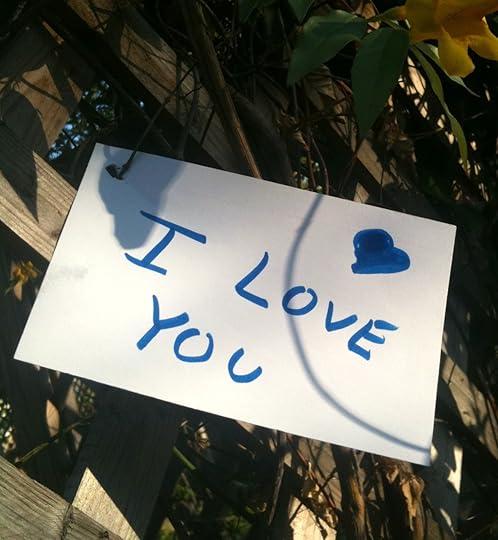
Standing in my kitchen filled with the warmth of baking sugar cookies and the scent of a cinnamon candle, I pressed the phone harder against my ear. Every one of his ragged breaths spears my heart. His wife, my dearest friend, is dying.
And I have no words.
How do you comfort a man losing his wife, his best friend, the one person in this entire world he counted on always to be there, always to love him?
Deep in the hard pit that used to be my stomach I realize you don’t. I can’t.
I finish the call and six young teenagers, some mine and some borrowed, race in from the cold to find the cookies. I hand them out, present in person but not in heart, as his last words swirls around me.
“Why is this so hard?”
My answer was, “I don’t know.” Does anyone know how to say goodbye and survive?
I pour milk for the chattering masses worried about Fall Out Boy concerts and cross country rankings. Yet all I can think about is it’s not the letting go that’s hard, it’s the leaving behind.
While her struggle will soon be over, his will just be starting. The world will expect him to grieve quickly and properly, take care of his children, go to work, accomplish things. Face the world with courage and strength and a smile stretched across his unnaturally thin face. Yet some accommodation will be made since he is the widower.
For her friends, those who have sent cards filled with love when they can’t send themselves, those who have sat by her bed, reading her books because she’s lost her vision, we will say goodbye at the proper time and struggle to move on.
But I’m afraid. Afraid if I do move on it will be as if she never existed, never counted.
Yet she did and she does.
With her middle-grade mysteries and women’s fiction novels, her great scarves, white flowers, and endless cups of grande lattes, she is bringing her warmth and light and laughter to a new home. An act which will leave our home darker and colder and quieter.
And I will have to continue fixing a manuscript that she loved and believed in yet is suffering under the weight of my sadness and impending loss. She isn’t just a dying wife, loving mother, and best friend. She is also my critique partner and head cheerleader. Since her diagnosis I have been floundering, lost without her wisdom and wit, desperately trying to make deals with God.
I am determined to finish my manuscript before she passes. I want to read it to her, let her know how much I valued her attention and insight, let her know she was loved. But I’m struggling with the hard. Both in the letting go of my friend and my manuscript.
“More cookies?” my daughter mumbles with a mouth filled with sugar and pink frosting. “Peesh?”
Assuming that was a “please” surrounded by pink sprinkles, I hand her the second plate and take another tray out of the oven unaware of the imminent danger.
One of the cookies is crooked, a bit overdone, and the frosting is smeared. And for some reason the frosting looks more red than pink.
“Eww!” My son points at this anomaly. “It looks dead. It’s a bleeding heart! Gross!”
They are heart-shaped cookies because that was the only cookie-cutter I could find. The others are probably hiding in the piles of laundry or empty flower pots that have yet to be put away for the season.
“I’m not eating it,” the other boy says.
“I dare you!” My daughter, the fearless one who wants to attend Hogwarts, be picked as a Tribute, and join the Dauntless Faction all at the same time, waves it in front of her brother. “I’ll give you my time on the Xbox.”
“No way,” he says, grabbing the milk container. “If I eat it, my heart might break too. And I haven’t even fallen in love yet!”
“You’re too scared to fall in love.” With a shrug, my daughter smiles, takes a bite, and leads her tribe of three girls back outside.
Left alone with my son and his friend, I say, “Don’t believe your sister. You’ll fall in love when the time is right. And when you do, you’ll feel no fear. All you’ll want to do is fly.”
He nods, but I realize I said the perfectly wrong thing. Where his twin would take off without wings, he would want to know ahead of time there was no risk. And he’d want that reassurance notarized and posted in public.
I apologize, but he just looks at his buddy and says, “It’s cool, Mom. But when I fall in love, I want it in writing that I won’t get hurt.”
He and his friend pack up the rest of the cooled cookies and leave for the part of the house as far away as possible from the girls.
And for the second time that day, I stand there with no words to offer.
If I can’t explain the benefits of love–and why it’s worth the risk–to a friend or my own son, what business do I have writing romance novels?
Suddenly, my daughter reappears. “Where is he?”
“Upstairs,” I say. “You hurt his feelings.”
“I know,” she says. “That’s why I’m giving him my Xbox time anyway. And tomorrow I’ll make his favorite pancakes.”
I am not surprised by her sudden reversal. It seems to be a teenage thing. But I am happy she is making amends.
“And Mom?” She pops her head around the corner of the kitchen. “I’m also scared to fall in love. But don’t tell him. He’ll think I’m weak.”
She disappears, leaving me in the center of the kitchen with a dirty mixer, pink-stained cookie sheets, and a dog who would love to lick up all the dropped sprinkles.
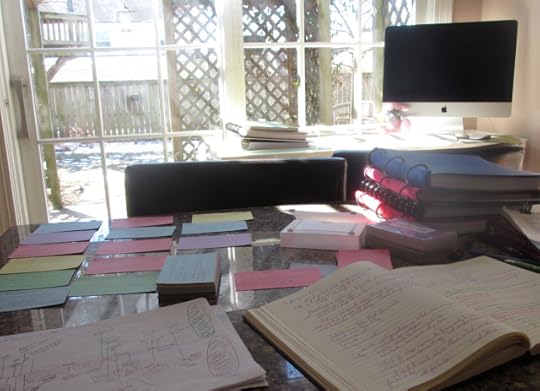
Weak.
Is that how my children see falling in love? As a weakness?
My heart breaks a little. How can I prove to them that falling in love–and staying in love–takes a lifetime of compromise, kindness, and courage? That falling in love is the antithesis of weakness? If talking to teenagers has a fifty-percent chance of penetration, how do I explain that falling in love–in spite of the dangers–is the most important thing they will ever do?
I look over at my desk covered in manuscript pages, note cards, highlighters.
Why is this so hard?
Why do I have to say goodbye?
Why can’t I finish this manuscript?
The birds outside my window struggle to find seeds in the mid-winter cold and I realize the truth. Life is hard because it’s a struggle to meet basic needs. Loving one another is hard because it counts on two people being vulnerable, taking risks, willing to lose the other to a breakup, debilitating disease, or death.
But writing about love? It’s more than hard. It’s devastating.
Love stories are written in the midst of the tears and suffering of real life. And while living through these emotions is difficult, reliving them through your characters is nothing more than a brutal reminder.
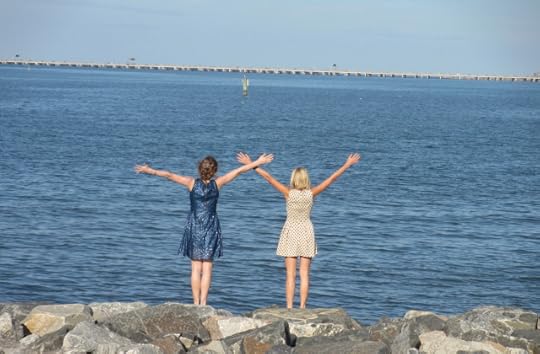
So why do I do it? Why do I force myself to sit down every day and throw words on the page? Because of the Happy Ending.
Yes, all romance novels have happily ever afters. And yes, I know, real life doesn’t. But that’s where the beautiful comes in.
Reading love stories, with their Happy Endings, allows us to revisit the most horrible of emotions in a safe, secure way. In a way that teaches us not just to survive, but to thrive. In a way that helps us heal, maybe even enough to try again.
And that means something.
Our words, our characters, our stories, mean something. This alone propels me back to my computer, my notes, my charts. If I finish this story with the care and passion it demands, I’ll find words of comfort for my friend and prove to my children that love is not a sign a weakness.
That love, especially when facing a loss, takes enormous courage.
That love, if you’re willing to take the risk, allows us to fly.
All photographs courtesy of Sharon Wray.
February 12, 2014
A Favorite Romantic Comedy
It’s Valentine’s week, so of course I wanna talk about one of my favorite romantic comedy movies of all time: “You’ve Got Mail” starring Tom Hanks and Meg Ryan.
I think the film does an awesome job of showing the development of a relationship—from the first spark and conflict, through the ensuing problems that keep the hero and heroine apart despite their simmering attraction, through the moments we see their connection and how good they would be together if they overcame their conflicts…to the Happily Ever After (HEA) ending we all yearn for.
Let’s take a look at why I love this movie and why it’s on my Keeper Shelf of romantic comedy DVDs.
First, it’s a classic David vs. Goliath/man vs. man plotline. We’ve got a hero and heroine on the opposite sides of the fence—he owns the bookstore conglomerate that’s going to put her tiny book shop- the one her mother started decades ago—out of business.
But the film also features another common romance genre plot twist—mistaken or hidden identity. Joe keeps his identity hidden from Kathleen a couple ways. In the beginning he shows up at her store to look around—purely a business move—and is immediately captivated by her personality. Not wanting to ruin the moment, he purposefully doesn’t share his last name: Fox, as in, Fox Books.
Here’s a clip of their “first meet”—notice the attraction or awareness between them and Joe’s bid to hide who he is.
http://www.youtube.com/watch?v=to-69CP_lYs
Of course, his identity can’t be hidden for long. When they both happen to attend the same cocktail party, the cat gets out of the bag. Kathleen’s unconscious knife wielding moment is perfect. It demonstrates the huge conflict between them and is a symbol of how emotionally difficult it is for her.
Here’s a clip that shows exactly what I’m talking about:
http://www.youtube.com/watch?v=sAQogHJ529g&list=PLh1kisojFEcMcziE8DDDqjDaU2xVnUuFt
So, their business conflict is set up perfectly. But this is a romance and we need to have some conflict there as well.
Romantically, their first conflict is that they’re both in relationships with someone else. Albeit, the wrong someone else. Also, Kathleen has developed a friendly on-line email relationship with some guy she only knows as NY152.
As viewers, we’re clued in to the fact that NY152 is really Joe Fox, though neither Joe or Kathleen realizes this. Of course, the set up only increases our anticipation of when or how this new hidden identity will be revealed. In this scene, Shopgirl (Kathleen) and NY152 (Joe) have finally decided to meet for the first time. It’s a big step for both of them.
Let’s see what happens when Joe discovers who his email penpal really is.
http://www.youtube.com/watch?v=ELiiiJPvycg&list=PL39BA65605C3CB452
Now, Joe could walk away, cut the email connection with Shopgirl and focus on business.
But, we know he’s taken with Kathleen and we can’t help but smile when he makes his next move, because we also know Kathleen is going to be anything but happy to see him.
As a viewer, we understand she’s emotionally distraught that what this man sees as a simple business move is deeply personal to her. We’re also aware of that fine line between love and hate, and how precariously close these two are toeing that line.
http://www.youtube.com/watch?v=hhHh-O8bf_A
That scene is a microcosm of the push and pull, the conflict and attraction, between our beloved hero and heroine. Classic and well done.
As the film continues, we get to a point where both of them have realized their significant others weren’t the right one and they’ve moved on. Kathleen’s store has closed and professionally she’s getting her bearings—she’s actually in a better place.
She’s still chatting with NY152. And he’s still keeping his identity a secret. Joe has recognized what an incredible woman she is and in his own way he tries to woo her. This part of the film is when the writer shows us how wonderful these two are together. Why this man and this woman are meant to be. Let’s take a peek at how the writer showed their camaraderie and how well-suited they are for each other.
http://www.youtube.com/watch?v=yRPwDJWhqis&list=PL88B3F28B220EDCC7
Aren’t they great together?
Now we get closer to the Big Black Moment when Kathleen has arranged to meet NY152 again. She’s convinced he’s the perfect guy. But for a while now, she’s been hanging out with Joe (as friends, or so she says) and we can tell she’s second-guessing herself. We know Joe is doing his best to win her over, but he still hasn’t shown all his cards. Just before she’s supposed to meet with NY152, Joe finally lays his heart on the line. As a viewer, I melted in my seat.
Needless to say, by the time Kathleen is standing in the park waiting for NY152, we’re anxiously waiting for Joe to come walking around the corner. We’re as nervous as he is, hoping she’ll be happy it’s him, rather than angry he’s been keeping this huge secret. You see, we’ve fallen in love with Joe, just as Kathleen has, even if she was too afraid to admit it—which is exactly the position we want our readers to be in with our hero and heroines.
Now, because as a romance writer and reader I need my HEA, let’s take a look at Kathleen and Joe’s.
http://www.youtube.com/watch?v=2cjvwTzhG8g
So, that’s one of my “go to” romantic comedies. What’s yours?

